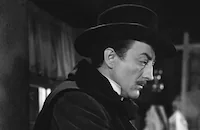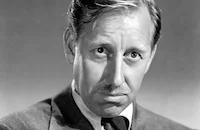Frenchie
Brief Synopsis
Cast & Crew
Louis King
Joel Mccrea
Shelley Winters
Paul Kelly
Elsa Lanchester
Marie Windsor
Film Details
Technical Specs

Synopsis
In the Western town of Bottleneck, Frank Dawson is murdered by his partner in crime, Pete Lambert, leaving Dawson's young daughter to fend for herself. Over the next fifteen years, she passes through myriad orphanages and jobs, gaining her moniker, Frenchie Fontaine, from a Parisian family she works for briefly. Her goal throughout the years, however, is to avenge her father's death, and after earning a fortune and nationwide notoriety as a New Orleans casino owner, she arrives in Bottleneck with her best friend, the Countess. Frenchie immediately visits the empty town casino, the Scarlet Angel, and learns from owner Jim Dobbs that former sheriff Tom Banning cleaned up the town years before, driving all the gambling business to the nearby town of Chuckaluck, which is run by Lambert. Sensing an opportunity to compete with her foe, Frenchie buys the Scarlet Angel and hires Jim to work for her. Meanwhile, Deputy Sheriff Jefferson A. Harding, alarmed by Frenchie's presence, calls Jim back to town after a three-year absence. When Frenchie then arranges to bring her New Orleans employees, including Lance Cole, to Bottleneck, she hears that Lambert is planning to ambush their stage. Frenchie and Jim join the stage in order to fight against Lambert, but when his men attack, Tom, who is on the stage, grabs Frenchie's pistol and insists that she and Lambert talk out their feud. Lambert does not want to reason, but after Tom kicks his gun out of his hand, he leaves. Within weeks, Frenchie's casino is a success, but she is bothered by Tom's constant presence, as is Lance, who loves Frenchie. Tom answers the complaints of the churchgoing community by insisting that Frenchie must break a law before he can arrest her. That Sunday, Tom is greeted at church by his ex-fiancée, Diane Gorman, eliciting the jealousy of her banker husband Clyde, who knows that Diane only married him for his money. Tom later spots Frenchie at her father's grave and guesses that she is Dawson's daughter. She admits her quest to him, and although he cautions her to remain lawful, he begins to investigate Lambert. Soon after, Tom learns that Frenchie has gone to confront Lambert, and follows her to Chuckaluck. There, she has convinced Lambert that he must partner with her or she will lure his customers away. Just then, Lambert spots Tom and tries to shoot him, but Tom grabs Frenchie's pistol from her thigh holster and escapes. Days later, Gorman incites the Bottleneck citizens into a vote against gambling. They have almost won the vote when Frenchie creates a stir over a fake gold rush causing all the men race into the hills. Guessing the scheme, Tom informs Frenchie that he will not allow her to ruin their law-abiding town. That night, Diane visits Tom to proclaim her love, and although he spurns her, Gorman sees them and assumes the worst. Diane then confronts Frenchie in the Scarlet Angel, offering to buy the casino in order to close it down, and unwittingly informs Frenchie that her husband has been Lambert's silent partner since the days her father was killed. Jealous over each other's interest in Tom, the two women begin a fight, which Tom breaks up. As he helps Diane home, Frenchie admits to Lance and the Countess that, although she has now identified her father's murderers, she no longer wants violent revenge. Lance angrily assumes that Frenchie changed her mind because the widowed Diane would then be available to Tom. That night, Gorman is shot in the back, and everyone assumes Tom killed him out of love for Diane. When he is jailed, Frenchie stages a breakout. After Tom and Jeff run to the hills, Tom reads a letter from the capital that reveals Gorman and Lambert's partnership, and assumes that Frenchie killed Gorman and then framed him, springing him from jail so he would look more guilty. He sets out on the trail, finding Jim, who informs him that Lambert is on his way to Bottleneck to forcibly take over the Scarlet Angel. Tom races to town to notify the citizens, who form a posse. Although Diane begs Tom not to get involved, he tells her to forget about him and then finds Frenchie in the casino, preparing to leave. Upon realizing that he thinks she killed Gorman, Frenchie gently admits to Tom that she loves him, but will leave him alone. As she slips away with the Countess, Lambert shows up with his men, and Diane, desperate to avoid bloodshed, admits to the townspeople that she killed Gorman in self-defense. Tom has not heard and so calls Lambert into the casino to talk one to one. Lambert pulls out his gun, forcing Tom to kill him. In the aftermath, Tom learns that Diane shot Gorman, and immediately sends Jeff to find Frenchie. He drags the two women back to the jail. Frenchie is despondent until she sees Tom waiting for her in the prison cell. While Jeff takes the Countess' arm, Frenchie locks herself into the cell and throws away the key.

Director
Louis King
Cast

Joel Mccrea

Shelley Winters

Paul Kelly

Elsa Lanchester

Marie Windsor
John Russell

John Emery
George Cleveland

Regis Toomey
Paul E. Burns

Frank Ferguson
Vincent Renno
Larry Dobkin
Lucille Barkley
Jack Ingram
Chili Williams
Shirley Ballard
Eileen Howe
Marie Allison
Mary Ellen Gleason
Billy Wayne
Hank Worden

Jerry Paris
Chubby Johnson
Tudor Owen
Sam Flint
Max Wagner
Paul Palmer
John Cliff
George Eldridge
John Pickard
Roy Butler
Sherry Hall
Perc Launders
Frank Malet
Al Ferguson
Art Dupuis
Sam Finn
Monte Montague
Helen Dickson
Jack Stoney
Frank Mccarroll
Steve Clark
Brick Sullivan
Jack Perrin
George Ryland
Crew
Glenn E. Anderson
Mickey Bennett
Oscar Brodney
Leslie I. Carey
Oliver Emert
William Fritzsche
Russell A. Gausman
Maury Gertsman
Alexander Golitzen
Bernard Herzbrun
Ted J. Kent
Michael Kraike
Hans Salter
Joan St. Oegger
Bud Westmore
Yvonne Wood

Film Details
Technical Specs

Articles
Frenchie
Frenchie (1950) was the second of three Westerns Joel McCrea made for Universal in the early fifties and they performed so well at the box office that Universal offered McCrea another three-picture contract. Filmed on location near Bishop, California, the film shares several similarities to Destry Rides Again (1939) in terms of the storyline but it was not an official remake - Universal would make a new version of it in 1955 with Audie Murphy in the title role. While Frenchie cannot compete with George Marshall's superior Destry Rides Again with James Stewart and Marlene Dietrich or even the Audie Murphy remake which was also directed by Marshall, it does have its virtues. Shelley Winters is appropriately feisty and combative in the title role and a lively match for McCrea. She also has a memorable catfight scene with Marie Windsor that mirrors the Marlene Dietrich-Una Merkel free-for-all in Destry Rides Again. In addition, the supporting cast is a cut above the usual Western programmer and includes Paul Kelly, Elsa Lanchester, John Russell and Regis Toomey.
According to The Hollywood Reporter, former model Dorothy Hart (I Was a Communist for the FBI, 1951) was originally cast in the title role of Frenchie but released from her obligation after objecting to certain aspects of her character. At one time, George Sherman was also assigned by Universal to direct Frenchie but Louis King took the helm instead. King, a former character actor in the silent era, began directing shorts in the early twenties and later specialized in B movies for several studios. Among his better known films are Charlie Chan in Egypt (1935), Thunderhead - Son of Flicka (1945) with Roddy McDowall and Mrs. Mike (1949) starring Evelyn Keyes and Dick Powell.
Producer: Michael Kraike
Director: Louis King
Screenplay: Oscar Brodney
Cinematography: Maury Gertsman
Editing: Ted J. Kent
Art Direction: Alexander Golitzen, Bernard Herzbrun
Music: Hans J. Salter
Cast: Joel McCrea (Sheriff Tom Banning), Shelley Winters (Frenchie), Paul Kelly (Pete Lambert), Elsa Lanchester (Countess), Marie Windsor (Diane Gorman), John Russell (Lance Cole), John Emery (Clyde Gorman).
C-81m.
by Jeff Stafford
Sources:
Last of the Cowboy Heroes: The Westerns of Randolph Scott, Joel McCrea and Audie Murphy by Robert Nott (McFarland & Company)
www.afi.com
IMDB

Frenchie
Quotes
Trivia
Notes
According to a February 1950 Hollywood Reporter news item, George Sherman was originally hired as the film's director. April 1950 Hollywood Reporter items add that Dorothy Hart was cast as "Frenchie Fontaine," but was released from the role after she objected to aspects of the character. Another April 1950 Hollywood Reporter item states that some scenes were shot on location near Bishop, CA. Some modern sources refer to Frenchie as a remake of the 1939 Universal film Destry Rides Again (see AFI Catalog of Feature Films, 1931-40), which was based on a novel by Max Brand, but Frenchie was not based on Brand's story, and is only thematically related to it in some plot points.














